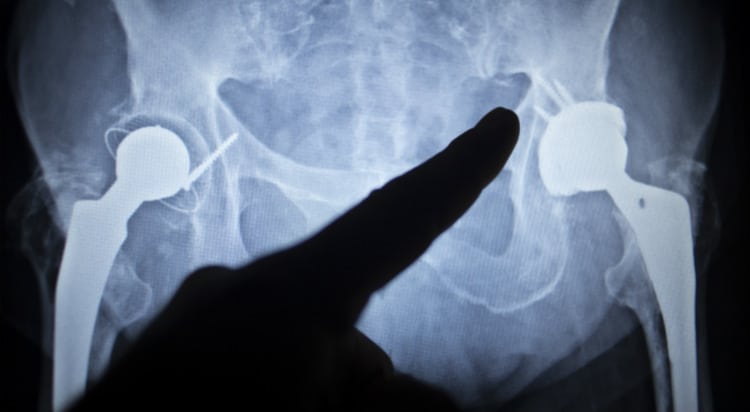Stryker Expands LFIT V40 Hip Implant Warning

In an urgent new Safety Notification, leading hip replacement manufacturer Stryker has ramped up its warnings around the LFIT V40 Femoral Head, a hip implant component linked to severe injuries in hundreds of product liability lawsuits.
Stryker Issues New Warning On LFIT V40 Femoral Head
In August 2016, Stryker recalled certain lots of the hip replacement component, citing an increased risk of taper lock failure, a complication in which the hip implant breaks apart inside the body. That year, Stryker withdrew 7 lots of the medical device from the global market, including the following catalogue numbers in the withdrawal:
- 6260-9-236
- 6260-9-240
- 6260-9-244
- 6260-9-340
- 6260-9-440
- 6260-9-344
- 6260-9-444
The withdrawn products were all manufactured before March 4, 2011, making it likely that many of the faulty hip implants had already been implanted in patients.
7 New Lots Added To Hip Replacement Safety Warning
Now, Stryker has expanded its warnings, quietly issuing on May 22, 2018, a new notification to surgeons and hospitals in America, Australia and Canada. Seven additional catalogue numbers are listed in the new warning letter:
- 6260-9-036
- 6260-9-136
- 6260-9-336
- 6260-9-040
- 6260-9-140
- 6260-9-044
- 6260-9-144
Again, the reason for the warning is listed as a “higher than expected number of complaints documenting femoral head / hip stem dissociation.” In short, the implant’s femoral head can break apart from the hip stem, leading to severe side effects for patients.
Importantly, the new warning has not been released in relation to an expanded product withdrawal. Stryker is not asking medical facilities to return affected devices; it is simply an informational update.
No New Instructions For Surgeons
Despite the additional safety instructions, no new instructions have been provided to surgeons by Stryker. As in the 2016 product withdrawal notice, Stryker advises medical professionals to follow their LFIT V40 Femoral Head patients “per the normal protocol.”
Stryker has sent the warning letter to all medical facilities known to have purchased an affected hip implant component. The health facilities are asked to sign and return a Business Reply Form, notifying Stryker that they have received the warning.
In another sign that Stryker is amping up its efforts at regulatory compliance, the company has established a “dedicated call center” for patients who have questions.
Stryker LFIT V40 Lawsuits
Hundreds of patients have already filed product liability lawsuits over the LFIT V40 Femoral Head, accusing Stryker and its subsidiary Howmedica Osteonics of releasing a defective hip replacement onto the market and downplaying the product’s risks.
As of July 18, 2018, 341 of these lawsuits were consolidated in the U.S. District Court for the District of Massachusetts. The cases have been assigned to District Judge Indira Talwani, who is guiding the litigation through coordinated pre-trial proceedings.
How Stryker’s Hip Replacement System Works
Stryker’s LFIT V40 Femoral Head is just one part of a modular system. Designed to be paired with one of the company’s Accolade-branded hip stems, which come in a myriad of sizes, the components were created to provide surgeons with a wider range of implant options, helping them find personalized solutions for the unique anatomy of each patient.
New Proprietary Titanium Alloy
The Accolade femoral stems are manufactured from a proprietary titanium alloy. In product marketing materials, Stryker and Howmedica Osteonics told consumers that their titanium alloy was both stronger and less rigid than other materials.
The LFIT V40 Femoral Head, on another hand, is made from CoCr, an alloy of cobalt and chromium commonly found in medical implants. Stryker made it clear in promotional materials that the femoral head’s CoCr material would be compatible with the company’s new titanium alloy, assuring surgeons around the world that there was little to no risk of corrosion inside the body.
Researchers Link “Catastrophic” Implant Failure To Corrosion
Medical research, however, called Stryker’s representations into question. In August 2016, researchers in the Journal of Bone and Joint Surgery published an investigative report, describing five cases in which patients who had been implanted with the Accolade / LFIT V40 combination had suffered “catastrophic failure” after their Accolade stems broke apart inside the body.
Upon inspection, the doctors found extensive metal corrosion in the implant. They attributed the catastrophic implant failures to this corrosion, as well as significant soft tissue damage found around the implant. Stryker’s recall came shortly after.
If you have been injured due to a defective hip implant, you may be eligible to file a lawsuit against the manufacturer. Contact Rosen Injury Lawyers today for a free consultation.
